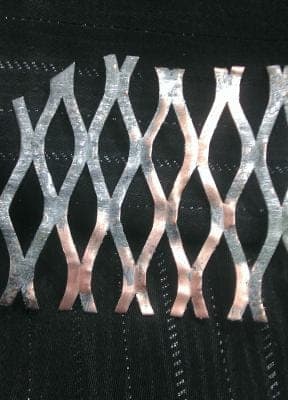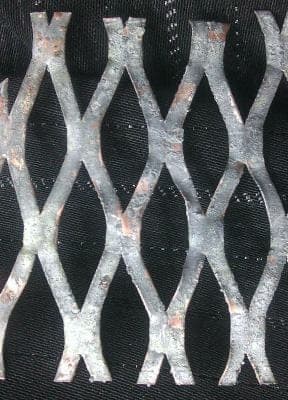
-----
Remove tin plating from copper pots, trays, cookware, etc.
⇦ Tip: Readers want to learn from your situation;
so some readers skip abstract questions.
Q. Sir,
Keith Wicklund: Kindly suggest normality of sodium hydroxide solution for stripping tin from copper base metal without any etching, little or no attack.
- chennai, tamilnadu, india
March 6, 2023
A. Hi Ananda. Keith is unlikely to be monitoring this page 25 years later, and his e-mail address is unlikely to work, but he suggested that 120 g/l sodium hydroxide be used in his procedure, which is essentially 3N.
Luck & Regards,

Ted Mooney, P.E. RET
Striving to live Aloha
finishing.com - Pine Beach, New Jersey
Ted is available for instant help
or longer-term assistance.
![]() Ananda, I am inclined to agree with Ted that Keith is unlikely to respond here. However, his addition to the world of knowledge that we may learn from is unforgettable and admirably appreciated. I hope you're doing well in MPLS, Keith. Skol!
Ananda, I am inclined to agree with Ted that Keith is unlikely to respond here. However, his addition to the world of knowledge that we may learn from is unforgettable and admirably appreciated. I hope you're doing well in MPLS, Keith. Skol!
Ted, you'e a madlad and I love it.
Learner of Trades - Kansas City, KS
December 9, 2024
Ed. note: Indeed, we are aware of Keith's contributions to the AESF in addition to his answering dozens of questions on this site.
Multiple threads merged: please forgive chronology errors and repetition 🙂
Stripping tin from copper signage
Q. I have some old copper letters that someone once upon a time covered with tin.
Copper has oxidized under it and small spots of copper oxide is coming up.
I may clean the copper but this, however, is not only taking a long time but also tends to bend the copper because it is thin.
How may I otherwise clean off the tin and the copper oxide?
Steins
Stein Sêther- Trondheim, Norway
1998
A. Stein,
Tin can be removed from copper and copper alloys in a solution of sodium hydroxide (120 g/l ), room temp. Make the work anodic, use a steel cathode at 6 volts. Alternately, Enthone sells a proprietary stripper (immersion- no current required) called Enstrip TL-105 which is specifically designed for removing tin and tin/lead alloys from copper and copper alloys. I have had great success with this product with little or no attack of base metal. With either method, you will be left with oxides on the surface of the copper which will have to be removed with a conventional bright dip or pickle. Good luck.
Keith Wicklund, CEF-SEavionics - Minneapolis, Minnesota
Multiple threads merged: please forgive chronology errors and repetition 🙂
How to strip tin from antique copper cooking pots?
Q. In my interiors shop I have about 10 cooking pots from the Ottoman Period of Turkey. They are Tin over Copper inside and out. How do I remove the tin from the copper safely? I have seen the same pots with the tin removed and feel they are more aesthetically appealing. The corrosion problem needs to be addressed also. Since they are cooking pots, food safety is a factor. Is there a product on the market that does this process safely? Is there a place of good reputation I could send them to to have them done? How is the waste disposed of? I look forward to your reply.
Leroy Zimmerman- Leola, Pennsylvania
2003
A. Actually, the tin lining you describe is there for a precise reason: a tin lining makes the copper safe for cooking. Frequently they also did a tin wash on the outside which I thinks highlights the sometimes elaborate designs of the cooking vessels. Later, copper was lined with nickel and then stainless steel. Unlined copper bowls are safe unlined for whipping egg whites, heavy whipping cream, or eggs for omelettes. Cooking in an unlined copper pan can be a health hazard, particularly with acidic food.
Barbara Landis- Tiburon, California
Q. I would like to know how to remove a tin wash from copper trays. They will not be used for food purposes?
Thanks
- Rockville, Maryland
2006
A. Hi, Leroy. Hi, Celia. Tin is easily stripped from copper pots with fluoboric acid, but this is a nasty industrial chemical that untrained people shouldn't use, especially in a residential environment. Please see if you can find a plating shop to do this for you. Good luck!
Regards,

Ted Mooney, P.E.
Striving to live Aloha
finishing.com - Pine Beach, New Jersey
Ted is available for instant help
or longer-term assistance.
Multiple threads merged: please forgive chronology errors and repetition 🙂
Strip stainless steel coating from copper cookware
Q. Usually the French copper cookware has a tin lining; however, more recently ones with stainless steel lining have appeared due to durability (the tin wears off and needs periodic re-tinning). Unfortunately, the stainless steel turned out terrible for cooking because food sticks to it quite badly (I only bought stainless steel lined cookware because the extra-thick copper wasn't available with the tin lined product lines).
I need a way to remove the stainless steel lining (fraction of a mm thick) with minimal damage to the copper before I take these to the re-tinning shop.
Is there any chemical and/or electrochemical method I can use to do the stripping? I've considered mechanical means, but it doesn't look like it could be done. Thank you for any helpful ideas.
Borislav TrifonovUBC - Vancouver, BC, Canada
2005
A. Hi Borislav
Stainless steel cannot be electrodeposited as far as I've ever heard. So I guess that topcoat was done by a PVD process, vacuum sputtering or something similar.
I do not know of any way to chemically or electrochemically strip stainless steel coatings from copper; I suspect it isn't possible. However, if tinning was done before that stainless steel coating, you may be able to remove the stainless by removing the tin that is holding the stainless steel onto the copper. Try stripping the tin per this page. Allow extra time for the chemical to penetrate through pores or thin spots in the stainless steel coating.
Luck & Regards,

Ted Mooney, P.E.
Striving to live Aloha
finishing.com - Pine Beach, New Jersey
Ted is available for instant help
or longer-term assistance.
Removing unwanted splashed tin coating from outside of antique copper tea kettle
Q. Recently purchase a nice antique dove tailed copper tea kettle. However, it has a big ugly appearance problem. Sometime long ago it appears someone did a very sloppy re-tinning of its interior. Question: How do I get the messy tin off exterior copper's surface? Thanks for any help!
Gloria Bowman2006
A. Try mixture of 1 part water/1 part muriatic acid ⇦ on eBay or Amazon [affil link] (conc.), 65 °C temp.
Good luck!
Goran Budija- Cerovski vrh Croatia
Multiple threads merged: please forgive chronology errors and repetition 🙂
Removing tin oxide from tin plated copper tray
Q. I have acquired a 150-year old traditional engraved copper tray from Oman. As these trays were used for serving food directly in contact with the tray, they were originally coated with molten tin, which was rubbed back while hot to a thin enough layer not to fill the engraving.
The original tin layer is fairly much intact, but oxidised almost to black. I'd like to remove the oxide and restore it to a bright tin finish (not back to copper), but abrasive cleaners and buffing will remove much of the tin. I'm looking for suggestions on chemicals which may do this - a very light buff may be necessary after this, but I'd like to avoid heavy buffing.
All ideas appreciated.
amateur antique restorer - Woolloomooloo (Sydney), NSW, Australia
2006
A. Try 5% nitric acid (or 5% hydrochloric, according to other sources). You must rinse it well! Electrolytic cleaning in 2-5% sodium carbonate
⇦ on
eBay or
Amazon]
solution (20-50 gm/1 lit water) can be used too(object must be connected to negative, stainless steel plate to positive pole, cca. 6V/0,5A/dm2).100 gm sodium carbonate/8 gm 'water glass'
⇦ on
eBay or
Amazon [affil link]
electrolyte can be used as option.
Good luck!
- Cerovski vrh Croatia
Multiple threads merged: please forgive chronology errors and repetition 🙂
Q. I am a scrapper. I brought copper grills in scrap but tin spray is on that material I want to remove it from the copper because nobody is purchasing. They are asking for clean copper without tin spray, so please advise me how to remove it because the quantity is big, nearly 1000 tons, please.


Thanking you
ratanlal choudharybuyer - Chennai Tamil Nadu, India
February 25, 2015
A. Hi Ratanlal. We appended your inquiry to a thread where a half dozen different possibilities were suggested. Considering the cost of stripping chemicals and the huge amount of waste that will be generated in stripping 2,000,000 pounds of material, it will surely be worth it to spend time trying 2 or 3 of the suggestions on a very small scale before committing to one for 1000 tons of scrap. Further, the recovered tin can be quite valuable.
It may be that sequential methods are very worthwhile; for example if the tin is heavy and if is a low melting temperature alloy, it may be worthwhile to try to melt some of the coating off before proceeding with chemical/electrochemical stripping.
I've seen a tin recovery factory bring scrap metal on freight cars into the plant on a railroad siding. There are probably firms already established who can deal with such a large quantity for you if you wish to go in that direction.
Regards,

Ted Mooney, P.E. RET
Striving to live Aloha
finishing.com - Pine Beach, New Jersey
Ted is available for instant help
or longer-term assistance.
Q. Can you tell me in detail how to separate tin plated copper? As this is a huge problem in Indian small scale industry.
Himanshu Jain- Mumbai, India
July 14, 2021
A. Hi Himanshu. If you'll slowly review this thread (which focuses mostly on consumers and their cookware), and/or thread 24504 (which focuses mostly on plating shops removing tin from their electroplated electronics), 16 readers have submitted 16 methods if I counted right. Each method is more or less appropriate depending on production volumes, robustness of the process, cost, availability, the need for 100.0000% removal of the tin, what operation if any will be done next on the stripped surface, etc.
Please tell us what is special about your case or about the needs of Indian small scale industry which distinguishes it, or which approaches you've tried and what happened, or which chemicals you can't get or are forbidden to use, etc., so we can better understand your situation and help you choose what to do. Thanks!
Luck & Regards,

Ted Mooney, P.E. RET
Striving to live Aloha
finishing.com - Pine Beach, New Jersey
Ted is available for instant help
or longer-term assistance.
Q, A, or Comment on THIS thread -or- Start a NEW Thread